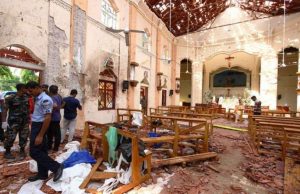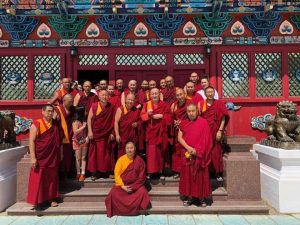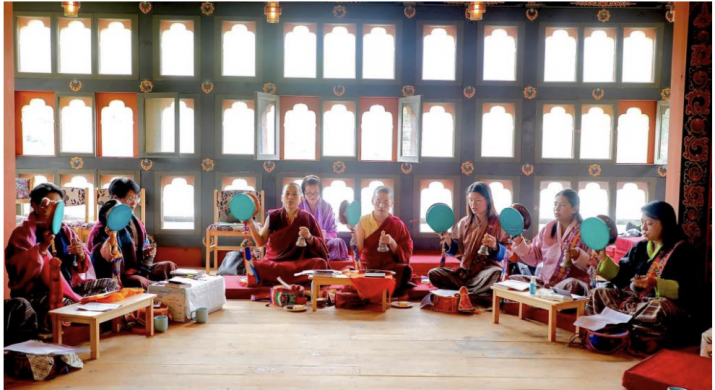
The Bhutan Nuns Foundation (BNF), which works to educate and empower Buddhist nuns in the remote Himalayan kingdom, recently offered an update on its conditions and activities amid the global COVID-19 pandemic, noting some of the positive outcomes and opportunities that have emerged despite the challenges and difficulties for the organization and Bhutan as a whole.
Operating under the patronage of Her Majesty the Queen Mother Ashi Tshering Yangdoen Wangchuck, the BNF is a non-profit organization striving to improve the day-to-day livelihoods of Buddhist nuns in the Kingdom of Bhutan and to enhanced their access to basic and higher education. The BNF aims to empower and educate Bhutanese girls and women to improve their living conditions as well as the economic vitality of rural villages, in turn helping to preserve the kingdom’s rich Buddhist culture in the face of rapid development.
“The current situation with COVID-19 has, of course, impacted the BNF quite a bit, especially because our major supporters are from outside Bhutan,” said Buddhist activist and BNF executive director Dr. Tashi Zangmo. “The Bhutanese people in general have taken advantage of this period of ‘hibernation’ due to COVID-19 as a time for reflection, and the nuns of Bhutan in particular have been able to concentrate and dedicate their prayers without distraction for all the visible and invisible beings on this planet.”
At the time of writing on 2 December, Bhutan, which was quick to implement a comprehensive trace-and-test regime soon after the SARS-CoV-2 coronavirus began spreading around the world, had reported 414 confirmed cases of COVID-19 and no associated fatalities, the lowest number of recorded cases in South Asia.
“While this unfortunate pandemic has disrupted the momentum of our planned activities this year, many unplanned good things came our way that we try to remember to appreciate,” Dr. Zangmo observed. “One good thing we did in planning our Training and Resource Centre construction project is that from the very beginning, with the wise guidance of Her Majesty the Queen Mother as the patron of the foundation, we decided to use local materials and to employ local builders as much as possible. Because of this foresight, we have experienced minimal impact in terms of the center’s progress compared with some other projects in Bhutan.”
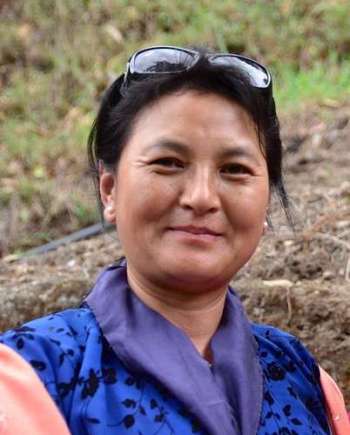
In 2018, the BNF announced that its long-awaited Training and Resource Center (TRC) in the capital Thimphu would receive its first intake of female monastics, with four nuns taking up residence. Once fully operational, the training center will provide a host of programs teaching life skills and social engagement education to female monastics and lay women following the Buddhist path. Courses will include counseling training, hospice and basic healthcare, palliative care, leadership and management, and teaching methodology for Buddhist nuns who will go on to become teachers. The BNF now hopes to complete the project by June 2021.
“While the Training and Resource Centre is still a work in progress, we are proud that it is a historical showcase that preserves Bhutanese culture, tradition, and the quality of work in our country, and that it is a place that our nuns will value and of which they will be proud,” Dr. Zangmo added.
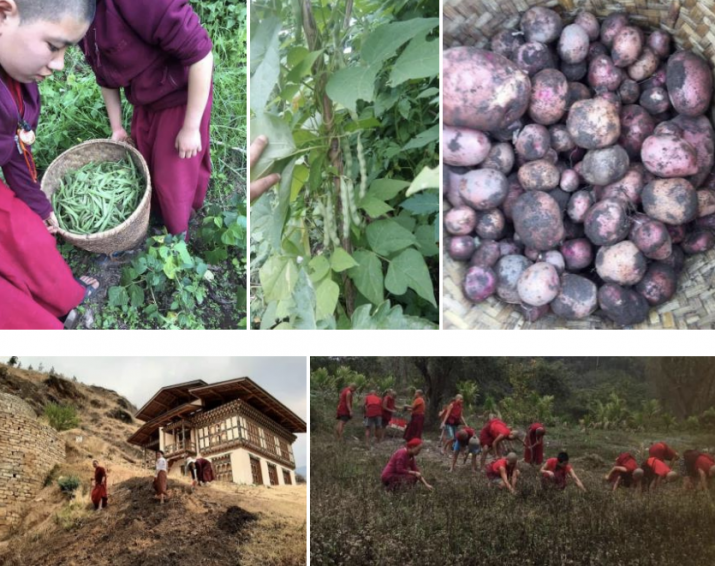
Dr. Tashi Zangmo was herself born and raised in one of the most remote and rural areas of Bhutan. After pursuing higher education in India and later the US, eventually graduating with a PhD from the University of Massachusetts-Amherst, she headed the Bhutan Nuns Foundation in 2009. The foundation now works with about 28 Buddhist nunneries across the country, educating and training nuns to be community leaders and teachers. In 2018, the BBC included Dr. Zangmo in its list of the world’s 100 most inspiring and influential women.
“Among our positive activities this year, we were able to officially pronounce 21 June as Bhutan Nuns’ Day—a significant occasion recognizing the contributions of the nuns of our nation, and one that I hope will spread beyond our country, Dr. Zangmo noted.
Many girls and women in Bhutan enter nunneries for varying periods of time to gain an education and to escape lives of poverty. These women often dedicate their lives to serving local communities, assisting needy families, and acting as role models. Despite the significant contribution Buddhist nuns make to Bhutanese society, the country’s nunneries often lack basic sanitation and adequate sleeping and cooking quarters, as well as facing a dearth of trained teachers and learning materials.

“As a result of the pandemic, we were able to engage in some activities for which we might otherwise not have had time,” Dr. Zangmo explained. “For example, we usually invite nuns and monks to perform prayers at the TRC construction site to create positive energy and move the work forward smoothly, and also for the safety and wellbeing of the workers. But this year, due to social distancing restrictions, we were unable to have monks and nuns perform prayers en masse. Thus, staff and friends of the BNF took advantage of this void and turned this obstacle into an opportunity, learning the necessary prayers and carrying them out on our own.”
By empowering the country’s nuns, ensuring that each nunnery maintains healthy living conditions, and providing practical education for the female monastic population, the BNF aims to create self-sufficient monastic communities that not only provide a healthy environment for Buddhist study, but also enable the nuns to actively engage with and contribute to lay society.
“We have also learned, more than ever, the importance of sustainability and self-sufficiency, and the value of food, friendship, and good health, and the overall value of life,” said Dr. Zangmo. “The nuns have learned survival skills including maintaining kitchen gardens and sewing masks, while also devoting themselves full time to daily learning, performing prayers, practicing compassion, and sending positive energy to families around the world who have lost loved ones.”
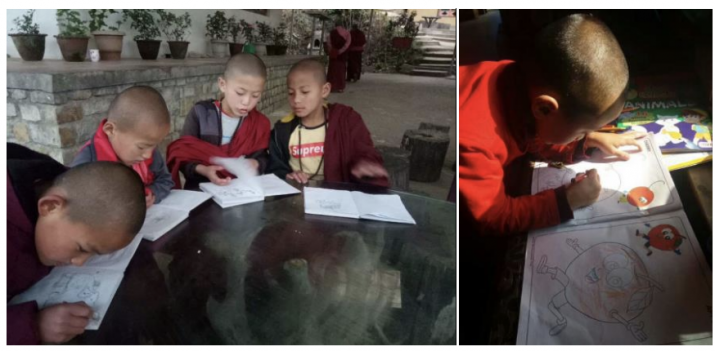
Most Bhutanese—about 75 per cent of the population of some 735,000 people—are Buddhists. And while the nation’s holistic approach to economic management has resulted in a healthy level of growth and low inflation over the last 20 years, life in Bhutan is not without very real challenges, even for those who find their calling in Buddhist monasticism. Female lay practitioners in particular face major obstacles in accessing opportunities for spiritual and practical education.
“In Bhutanese culture, we are taught to practice gratitude daily, to give thanks every day for being alive, and to practice impermanence,” said Dr. Zangmo. “But different cultures do things differently—some nations and cultures give special thanks at this time of the year, even celebrating Thanksgiving Day. Whatever one’s custom, we cherish the opportunity to remember to be grateful for who we are, for what we have, and for what we might be able to do for others, despite the difficult circumstances that have come our way. We have all been through a lot this year; the world has been through a lot. I am more than grateful that those brothers and sisters around the world who are in some way or another connected to us professionally or personally have managed to keep themselves safe and healthy.”

See more




